
Brendan Kochunas wins DOE Distinguished Early Career Award
Kochunas’ research seeks to advance our understanding of the digital twins’ concept for nuclear engineering applications.

Kochunas’ research seeks to advance our understanding of the digital twins’ concept for nuclear engineering applications.
Brendan Kochunas, associate professor in the U-M Department of Nuclear Engineering and Radiological Sciences (NERS), has been awarded funding for research as part of the U.S. Department of Energy (DOE) Office of Nuclear Energy’s Distinguished Early Career Awards Program.
“NERS is very proud of Brendan and his intellectual leadership in nuclear engineering,” said NERS chair Todd Allen. “His outstanding work is foundational to decades of NERS continuing as the leading nuclear engineering program in the U.S.”
The Distinguished Early Career Award will support Kochunas’ research into advancing our knowledge and understanding of the digital twins’ concept for nuclear engineering applications. The project will use data simulations to develop a foundation for creating models for nuclear energy systems and their components. Kochunas will also create a curriculum for teaching these methods.
“I think it’s really great that DOE-NE started an early career award,” said Kochunas. “I hope that they expand this program in the future because there are a lot of talented junior faculty working on nuclear engineering. It is an honor to be a part of the inaugural group of recipients.”
Kochunas also supports the NERS-based Project SAFARI – Secure Automation for Advanced Reactor Innovation, which will develop AI-enhanced digital twins of nuclear reactors with a grant from the Advanced Research Projects Agency–Energy.
Kochunas’ research focus at NERS is on the next generation of numerical methods and parallel algorithms for high-fidelity computational reactor physics. His areas of expertise include neutron transport, nuclide transmutation, multi-physics, parallel programming, and HPC architectures. He joined the NERS faculty in 2019 where he eads the Nuclear Reactor Analysis and Methods (NuRAM) group and the Nuclear Plant Simulation Laboratory (NPSL). A core component of the NPSL is the Virtual Ford Nuclear Reactor (VFNR), an XR Initiative led by Kochunas and funded by U-M Center for Academic Innovation.
During his time as a PhD student, Kochunas initiated and led the development of the MPACT code that became the main deterministic neutronics tool within the CASL (Consortium for Advanced Simulation of Light Water Reactors) project and subsequently within VERA (Virtual Environment for Reactor Applications). MPACT was not only born out of his PhD research but has also become a central research tool in the work of more than 16 other PhD students in the NERS department.
This year, the DOE awarded more than $3.1 million through its newly established Distinguished Early Career Program to support five early career faculty in five states. Kochunas will receive a grant for $625,000 to support his research.
